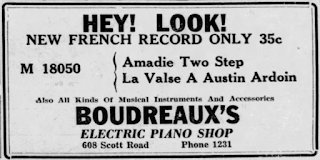When Amédé was nine months old, his father was killed in an accident. The story goes that his father and mother owned a very successful farm at the time and had earned enough to buy land. Supposedly, they had a 120-acre plot of land, with his father often hauling meat to various places. Apparently, as he was hauling meat across a wooden bridge, his wagon fell into the bayou, and he was killed.1
Donc, bye-bye, je m'en vas mes parents,
Moi, je m'en vas, c'est rapport à la catin,
Donc, jamais j'aurais crû fallait je m'en vas,
Moi, tout seul et la quitter derrière,
'Gardez-donc, aussi loin, crois vous-même, moi, je suis après aller,
Moi, je la quitte, jamais encore je vas la rejoindre.
Donc, bonsoir, bonsoir, mes parents,Je suis orphelin, il y a, beaucoup des années,Mais, il faut je prends mes misères comme ça vient,Mes parents, il y en a pas un qui veut me voir,Quand je suis malade, il faut je vas chez les étrangers,Ça pris eux-autres pour me soigner dans ma souffrance.O, yé yaie, toi, petite fille,Je serais curieux te rejoindre, quand même, une autre fois,Pour moi être capable te dire comment dur ça c'est être orphelin,"Tite fille, marie-toi, quand toi tu seras capable.
 |
| Daily Advertiser Aug 26, 1932 |
By the time Amédé was a teenager, he was beginning to play music. The loss of his father and the care his elderly mother required was too much to handle, according to his cousin "Bois Sec" Ardoin,
Amede's mother was poor and old, too. He tried to help a little bit after he was big enough, but after somebody found an accordion for him, he'd go and play. He didn't help his mama no more. He stayed with the white people.2After his mother passed away in the 1920s, Amede moved into the home of his brother Austin. For the rest of his days he would sing of his life as an orphan.2 By 1930, he traveled with fiddler Dennis McGee, recorded a song about his troubles, and named it "La Valse A Austin Ardoin" (#576). The recording contains an eerie sound that wasn't present to listeners until modern times. According to producer to Christopher King and author Amanda Petrusich,
Listen very carefully to "La Valse A Austin Ardoin". When the accordion break occurs between the vocals, you can hear him humming--like a Glenn Gould--type sound. Amédé Ardoin is giddily humming along with himself, doubling the melody, goading it forward.4
 |
| Austin Ardoin |
So, bye-bye, I'm leaving my family,
I'm going to go, it's because of the pretty doll,
So, I never thought I'd have to leave,
I'm all alone and leaving her behind,
So look here, (going) so far away, believe it yourself, I'm going,
I'm leaving her, never again to rejoin her.
So, good evening, good evening, my family,
I've been an orphan, over there, for many years,
Well, I must handle my miseries as they come,
(Of) my family, there is no one who wants to see me,
When I'm sick, I have to go to strangers,
It takes them to heal me in my suffering.
Oh, ye yaille, you little girl,I would be curious to join you, in any way, one more time,For me to be able to tell you how hard it is to be an orphan,Little girl, get married, when you, yourself, are ready.
 |
| Daily Advertiser Jul 30, 1931 |
He and McGee quickly became known and respected not only by the Creole community, but by the white Cajun community. Amédé had three recording sessions, in 1929, 1930, and 1934. His catalog is probably about 34 or 35 songs, which undoubtedly represents a very, very small volume of the overall repertoire that he had.1
- https://kreolmagazine.com/culture/features/amede-ardoin-and-his-legacy-a-discussion-with-darrell-bourque/#.XH_u-8BKhhE
- The Kingdom of Zydeco By Michael Tisserand
- Mardi Gras, Gumbo, and Zydeco: Readings in Louisiana Culture edited by Marcia G. Gaudet, James C. McDonald
- https://www.oxfordamerican.org/magazine/item/244-amede-ardoin-accordion-virtuoso
Release Info:
NO-6718-A La Valse A Austin Ardoin | Brunswick 576 Melotone M18050
NO-6717-A Amadie Two Step | Brunswick 576 Melotone M18050
Find:
I'm Never Comin' Back: The Roots of Zydeco (Arhoolie, 1995)
Cajun Country, Vol. 2, More Hits from the Swamp (JSP, 2005)
Mama, I'll Be Long Gone : The Complete Recordings of Amede Ardoin, 1929-1934 (Tompkins Square, 2011)


No comments:
Post a Comment
Got info? Pics? Feel free to submit.